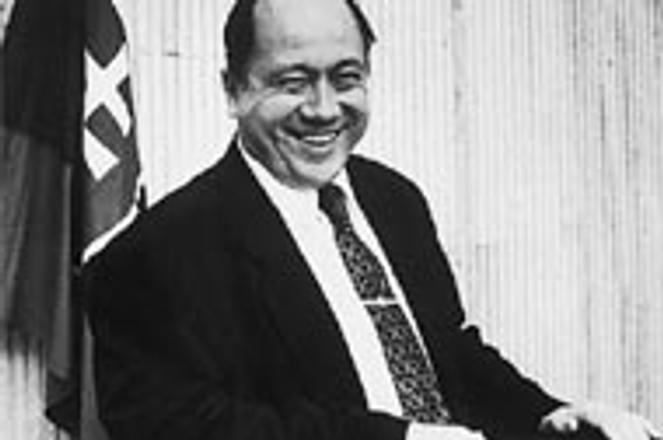All smiles. Culture Minister Ivan Hudec survived twice.Vladimír Hák
Ivan Hudec is a survivor. Twice in three days, on September 17 and 19, the Culture Minister withstood no-confidence votes in Parliament. Though he survived the vote, the action has opened a deep rift between Hudec and MPs in the ruling coalition and scores of people in the country's artistic community.
Those personalities - some of Slovakia's most prominent actors, film and theater directors, painters and sculptors - are now Hudec's sworn enemies who do not share his idea that the ministry has the right to micromanage the nation's cultural life just because it allocates the money.
"It's the taxpayers money, our money, and the minister [should be] nothing but a humble administrator,'' said Emil Horváth, an actor from the Slovak National Theater (SND) earlier in September. "It's a demonstration of the arrogance of power," said sculpter Rudolf Síkora.
The friction between some in the arts and Hudec's ministry has been brewing for several months. In that time, Hudec has reorganized state-sponsored cultural institutions with an untransparent distribution of money, merged theaters in different regions, and allegedly installed people loyal to the government in top positions in state-owned theaters and museums.
Tensions came to a boil when Hudec forced the director of the National Theater's drama ensemble to surrender his position to long-time SND actor Ľubomír Paulovič. Scores of SND actors rebelled against the move, sparking rallies that led to Paulovič resigning his new post. Horváth and his colleagues say that, by ignoring the voices beneath him, Hudec is worse than the communists, who at least made sure a new director would be accepted by the ensamble.
"Spoiled kids of the revolution"
According to Hudec, the protesting artists are "anti-Slovak" and "spoiled kids of the revolution," as he called them. Yet it was the artists and students who in November 1989 started the "Velvet Revolution'' that eventually caused the fall of Communism.
"We are just building a normal structure of a national culture any other state has - and that is a thorn in the side of those who did not want this state," Hudec said. "Before, they devided us according to membership in the communist party. Now, they do it according to the loyalty towards the ruling movement and pro-national approach," said Síkora.
At a regular political rally with the supporters of Prime Minister Vladimír Mečiar and his Movement for a Democratic Slovakia (HZDS) several days before the first no-confidence vote took place, Hudec extended his rhetoric even further. Hudec called the artists' forum "a nest of drug users," and promised the HZDS supporters he would not let the situation get out of his hands.
Mečiar capped off the display by saying that if Hudec survives the no-confidence vote, the leadership of the Slovak National Theater would be removed. The no-confidence votes were initiated by opposition parties in Parliament after a majority in Slovakia's artistic community founded a forum titled "Let's save culture."
Though 139 of the total 150 MPs showed up for the September 17 vote by secret ballot, only 62 actually voted, far less than the 76 required for a quorum.
"We made sure that there would not be the necessary 76 votes to recall the minister,'' HZDS member Milan Sečánsky explained later. "The voting has showed that the deputies of the ruling coalition cannot have and do not have independence,'' said Arpád Duka Zólyomi from the Hungarian coalition. "They picked up their ballots but did not throw them in the ballot box, because they had to prove to their deputy club that they did not vote.''
The next day, opposition deputies again collected more than the 30 signatures necessary to initiate a no-confidence vote. It took place the following day, was not secret, and failed. Actually, no one really believed Hudec would be ousted in a public vote after surviving an anonymous one, so the vote became a matter of principle.
The three days left the protesting playwrights seething. "I came to the conclusion that the coalition deputies are not interested in culture... It is evident that minister Hudec does not like culture," said film director Dušan Trančík as he stalked out of Parliament. "He is a man who enjoys being in power and who absolutely doesn't understand the principles of democracy.''
But the coalition deputies were satisfied. "Minister Hudec has done a lot to develop Slovak culture. I see no reason to why I should not trust him,'' said Ján Cuper, a HZDS deputy. "He pushes through those movements in Slovak culture that are based on national traditions."
He often repairs the deeds committed by previous ministers supporting so-called cosmopolitan artistic groups.''
His colleague Roman Hofbauer - who had nodded off when the opposition first presented its reasons why Hudec should be ousted - added that because the Slovak National Theater supported the no-confidence vote, "it does not deserve to be called Slovak and National anymore.''


